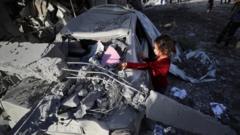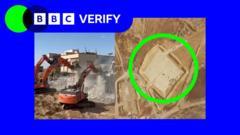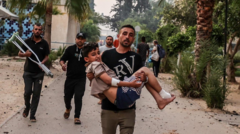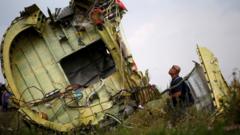In a critical development within the ongoing Israel-Gaza conflict, Israel has issued a sweeping evacuation order for residents in Gaza City as military operations escalate. The Israeli Defense Forces warn of impending strikes, leading to significant fears for civilian safety. Former Prime Minister Ehud Olmert argues against the military expansion, citing mounting humanitarian crises and urging for the provision of essential needs to the Palestinian population.
Israel Issues Widespread Evacuation Order Amid Intensifying Military Campaign in Gaza
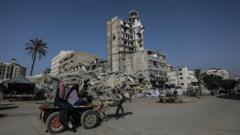
Israel Issues Widespread Evacuation Order Amid Intensifying Military Campaign in Gaza
Civilians in Gaza City are ordered to evacuate as Israel prepares for intensified strikes, raising humanitarian concerns amidst the ongoing conflict.
Israel has issued one of the most extensive evacuation orders for civilians in Gaza, directing residents to leave parts of Gaza City that the Israeli Defense Forces (IDF) have declared unsafe due to impending military strikes. This order has raised serious concerns for local displaced people taking refuge in the area, especially at sensitive sites such as Al-Shifa Hospital and the Islamic University, which Israel claims are being utilized by Hamas as operational bases.
Aid agencies warn that evacuating these zones could lead to a significant civilian toll, as thousands remain within them. Former Prime Minister Ehud Olmert has emerged as a rare voice among Israeli leaders calling for a reevaluation of military strategies. He voiced significant disapproval of the campaign’s escalation, echoing sentiments that many Israelis and military commanders allegedly share.
In a BBC interview, Olmert described the ongoing humanitarian crisis as "intolerable" and called for immediate actions to alleviate the suffering in Gaza. His remarks reflect a growing domestic concern over the war's effects on Israel’s international reputation, solidarity among its citizens, and the dire conditions faced by Palestinians in Gaza.
The backdrop of this conflict includes an ongoing blockade that has severely limited food, medicine, and fuel access to Gaza’s 2.1 million residents. The United Nations has emphasized that the region is on the brink of famine with alarming food insecurity levels. Government spokesman David Mencer contended that the situation is primarily due to Hamas's actions rather than Israeli policy, denying any state-sponsored starvation.
As the violence continues, recent reports claim that Israeli airstrikes have resulted in substantial casualties, including over 2,799 deaths since a recent uptick in conflict began. Despite proposed ceasefire negotiations, Prime Minister Netanyahu remains committed to expanding military operations, dismissing calls for de-escalation. A public poll indicates a significant portion of the Israeli population favors negotiating for hostages’ return, even if it means pausing military actions—a stance Netanyahu has, so far, resisted.
The situation in Gaza remains critical, with the UN warning that the populace faces a growing humanitarian crisis if assistance is not urgently provided. As the conflict endures, voices from within and outside Israel continue to advocate for peace and humanitarian access amidst the turmoil.




